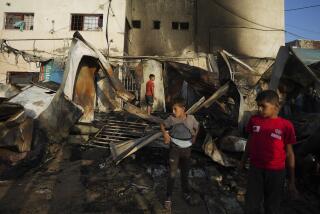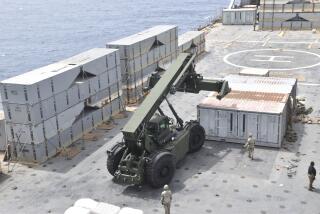Relief Officials Ambivalent on Troop Moves to Somalia
NAIROBI, Kenya — Relief officials on Thursday welcomed with some wariness the indications that the United States and United Nations may significantly step up efforts to improve security in famine-stricken Somalia, with the American government offering up to 30,000 troops for a multinational force to protect aid supplies and convoys.
“This is obviously welcome news, because it would give us the ability to get food to more people who need it,” said Paul Mitchell, a spokesman for the U.N. World Food Program, a major provider of relief food to the area.
But he cautioned that adding a major combat force to the welter of factional armies, bandit gangs and armed, free-lance looters already afflicting the country “means the chance for increased violence.”
Among the major worries for the World Food Program and other relief agencies, he said, is that “some of the sides may take out their frustrations on relief workers already in the country.”
The American offer came after U.N. Secretary General Boutros Boutros-Ghali warned the Security Council that worsening problems at the key ports of Mogadishu and Kismayu, and the obstinacy of factional leaders resisting deployment of 500 U.N. security guards at Mogadishu, are bringing relief efforts to a standstill. He suggested a drastic reconsideration of the U.N. approach to the problem of aiding starving Somalis.
Current Security Council resolutions permit the deployment of armed U.N. forces in Mogadishu with consent of local authorities. U.N. officials in Somalia complain that they have been hamstrung by the requirement.
“Authorities in Somalia do not exist in the sense we know,” said Ismat Kittani, the United Nations’ special representative in Somalia, last week in Nairobi. “. . . Sometimes an authority is no more than three or four people with guns.”
The rules of engagement for the U.N. troops now permit them to return fire if attacked. But the rules do not anticipate a U.N. military offensive of any sort. A change in approach would presumably require further Security Council action.
That may yet happen because the inability to reach a political settlement has meant a sharp deterioration in security in the capital. “Conditions in Mogadishu have been getting worse and worse,” said Rick Grant, a spokesman for CARE International who recently returned here from the Somali capital. “There are more incidents every day of car hijackings, guns being fired, general sullenness on the part of the armed Somalis.”
While hundreds of Somalis die each day from starvation, neither the United Nations nor the International Committee of the Red Cross has been able to move significant quantities of relief food out of the seaports. About 11,000 tons of food has been kept at a dockside warehouse for three weeks because the truck convoy needed to transport it to famine zones in the interior would almost certainly be hijacked, probably with loss of life, if it moved out.
Just last week, a 10-truck convoy was ambushed on its way to Baidoa, a major feeding center, and as many as 40 of its escorts killed. Only one of the 10-ton trucks made it through to Baidoa.
A detachment of 500 Pakistani troops stationed in Mogadishu under the U.N. flag has been unable to deploy sufficiently to protect relief operations, as planned, at the port and airport.
The World Food Program, CARE and several other agencies have agitated for weeks for a stepped-up security program.
“Our initial reaction is that more troops will mean better security, and better security means more food will make it into the interior to the people in need,” Grant said.
But others warned that, without a political solution in Somalia, foreign troops will be tied down in inconclusive fighting or the United Nations will be forced to take over all administrative authority in Somalia, along the lines of the “trusteeships” established in the 1950s and 1960s over colonial territories moving toward independence.
“I firmly believe that the tragedy that is Somalia today cannot be solved militarily,” said Kittani, the U.N. representative. “We need the cooperation of all Somalis at all levels.”
More to Read
Sign up for Essential California
The most important California stories and recommendations in your inbox every morning.
You may occasionally receive promotional content from the Los Angeles Times.










